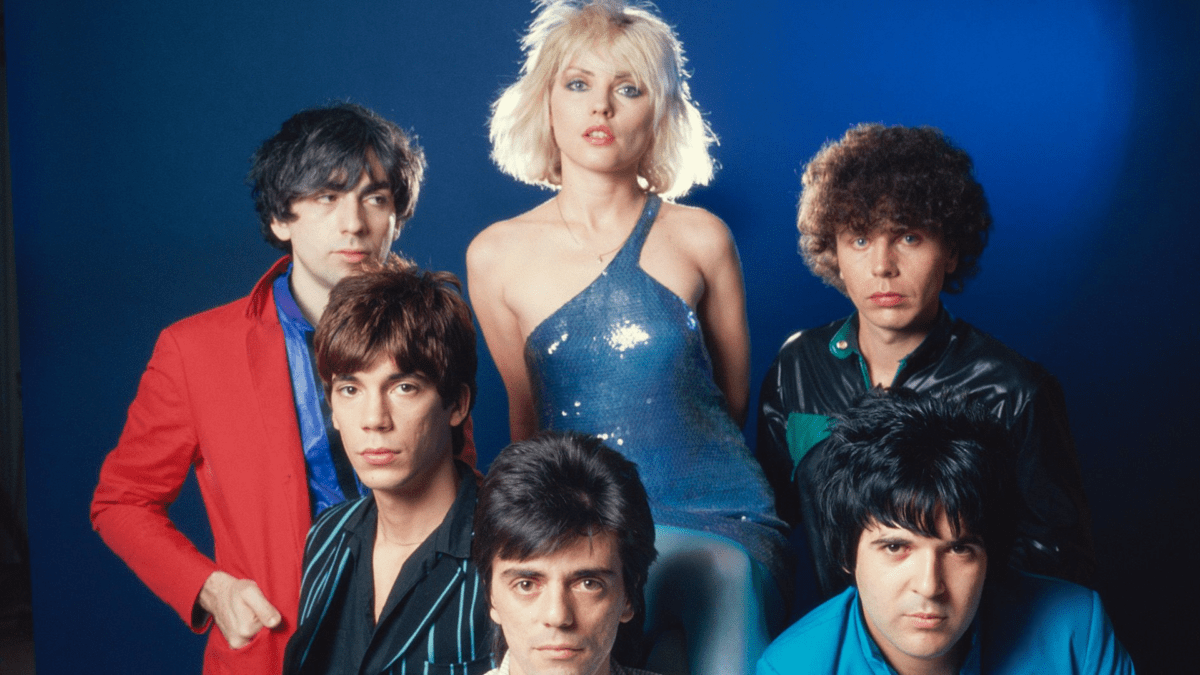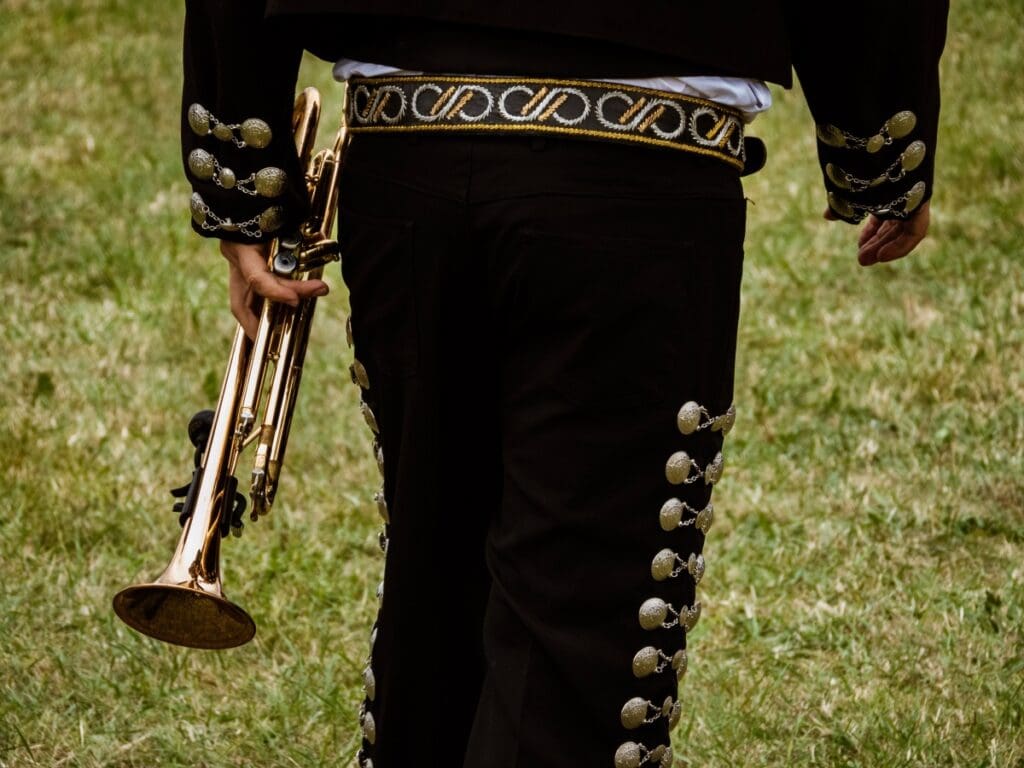
Mexico is famous for its rich cultural heritage, vibrant traditions, and lively music. One such music style is mariachi, an iconic genre that has captured the hearts of people around the world. This dynamic and soulful genre is an integral part of Mexican culture and has been passed down through generations, evolving with each new generation of musicians and listeners. But what is mariachi music?
In this comprehensive guide, we’ll tell you everything you need to know about the vibrant genre, including where it came from and how it has evolved, as well as discussing its history, origins, and fundamental musical elements. Furthermore, we’ll discuss its role in Mexican celebrations and events and examine famous mariachi bands and artists.
So, let’s embark on this fascinating journey to discover the soul of Mexico through the vibrant world of mariachi music!
What Is Mariachi Music?
Mariachi music is a traditional Mexican musical genre combining Spanish, Indigenous, and African music elements. It is characterised by stringed instruments, brass, and vocals, often accompanied by lively rhythms and elaborate costumes. Mariachi is typically performed by a group of musicians, known as a mariachi band or conjunto, who come together to create a rich tapestry of sound and emotion.
At its core, mariachi music is about storytelling and conveying the emotions of love, joy, sorrow, and passion through song. The lyrics often touch on themes such as love, heartbreak, patriotism, and the beauty of nature, painting vivid pictures in the listener’s mind and evoking powerful emotions. Whether it’s a lively, upbeat song that makes you want to dance or a heartfelt ballad that brings tears to your eyes, the genre has a unique ability to connect with people on a deep, emotional level.
Origins of Mariachi Music
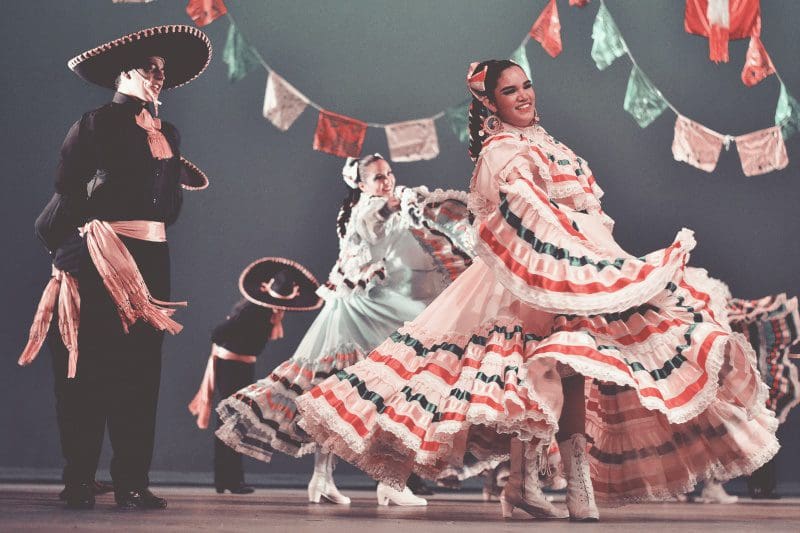
The exact origins of mariachi music are a subject of debate among scholars and musicologists. Some believe that it dates back to the 16th century during the Spanish colonisation of Mexico, when Indigenous and African musical traditions began to mix with Spanish music. Others argue that mariachi originated in the 18th century in the western Mexican state of Jalisco, which many still consider the genre’s heartland today.
One of the most widely accepted theories about mariachi music’s origins is that it developed in the 19th century in rural areas of Jalisco, where it was primarily performed at local celebrations and social gatherings. As the genre grew in popularity, it began to spread throughout Mexico and eventually made its way to the capital, Mexico City. There, it continued to evolve as it was exposed to new musical influences and styles, eventually becoming the diverse and dynamic genre we know today.
Mariachi Music History
The history of mariachi music is a rich tapestry of cultural exchange, innovation, and evolution. From its early beginnings in rural Jalisco to its current status as an internationally recognised style, the genre has undergone significant musical and cultural transformations.
In the early days of mariachi music, bands were composed of stringed instruments such as the guitar, violin, and harp. However, as the genre evolved, new instruments were added to the mix, including the distinctive guitarrón (a large, deep-bodied bass guitar), the vihuela (a small, five-string guitar), and brass instruments such as trumpets. These additions expanded the ensemble’s sonic possibilities, helping create the unique sound we associate with mariachi music today.
As the genre gained popularity throughout Mexico, it began to feature at a broader range of events and celebrations, including weddings, baptisms, and religious festivals. This increased visibility helped to solidify the genre’s status as a critical element of Mexican culture and identity.
The Role of Mariachi Music in Mexican Celebrations and Events
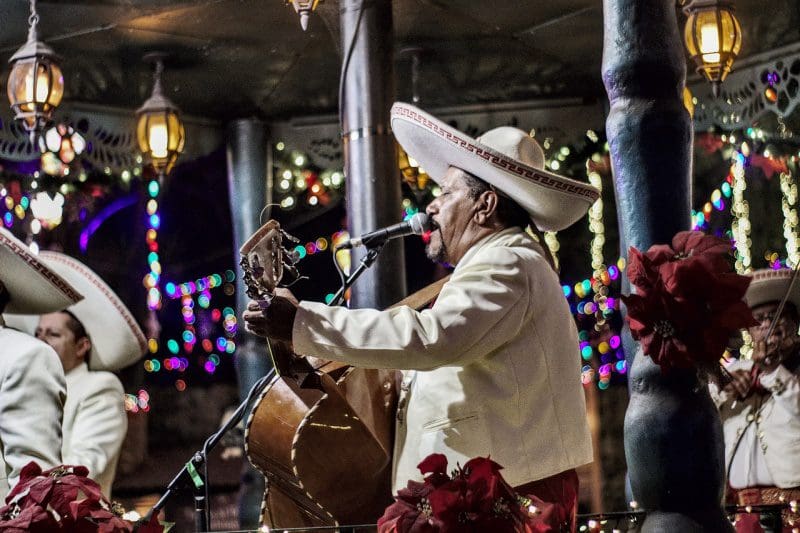
Mariachi music plays a central role in Mexican celebrations and events, serving as a powerful means of bringing people together and fostering a sense of community. From intimate family gatherings to large public festivals, the presence of a mariachi band can elevate the atmosphere and create a memorable experience for all in attendance.
One of the most significant events where mariachi music is featured is the celebration of Mexico’s Independence Day, El Grito de Dolores, on September 16th. Mariachi bands perform across the country in town squares, parks, and other public spaces, helping to create a festive atmosphere and commemorating the country’s rich history and culture.
In addition to national holidays, mariachi music is a fixture at important life events such as weddings, quinceañeras (celebrating a girl’s 15th birthday), and funerals. In these contexts, the genre honours traditions, expresses emotions, and creates a sense of continuity between generations.
The Cultural Significance of Mariachi Music in Mexico
Mariachi music is more than just entertainment in Mexico; it is vital to the country’s cultural heritage and identity. The genre’s unique blend of Spanish, Indigenous, and African influences reflects the diverse history of Mexico and serves as a testament to the resilience and creativity of its people.
Through its song lyrics and melodies, mariachi music tells the stories of Mexico’s past, present, and future. They convey a sense of pride and patriotism that resonates deeply with listeners. This connection to the country’s history and culture is further reinforced by the elaborate costumes of mariachi musicians called trajes de charro. These outfits, which consist of embroidered jackets, pants, and wide-brimmed sombreros, pay homage to the traditional clothing of Mexican cowboys. Furthermore, they serve as a visual reminder of the genre’s roots in rural Jalisco.
Recognising its cultural importance, UNESCO declared mariachi music an Intangible Cultural Heritage of Humanity in 2011, further solidifying its status as a vital and cherished element of Mexican culture.
The Instruments of a Mariachi Band
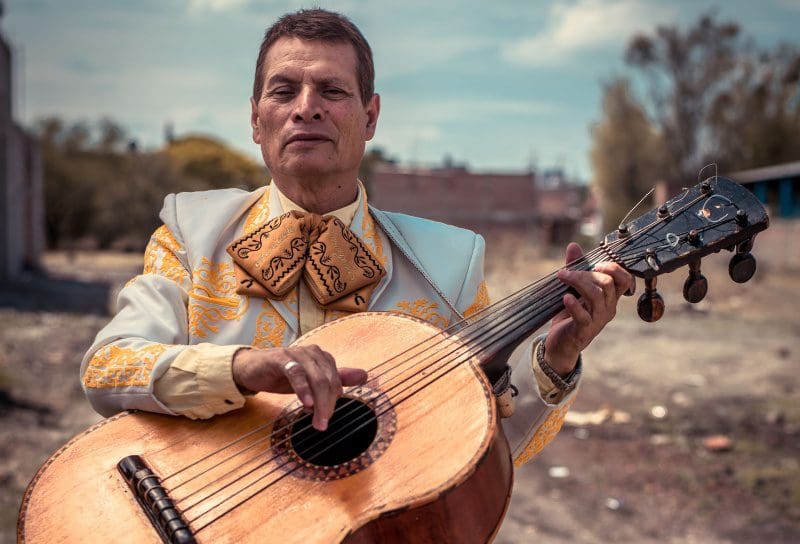
A mariachi band, or conjunto, typically combines stringed, brass, and percussion instruments. Each instrument is crucial in creating mariachi music’s distinctive sound and texture. Here are the most common mariachi band instruments:
- Violin: The violin is a key melodic instrument in a mariachi band. It often plays intricate and expressive melodies that evoke strong emotions.
- Guitar: The guitar provides rhythmic and harmonic support, helping to create the foundation for the mariachi sound.
- Guitarrón: This large, deep-bodied bass guitar is responsible for providing the low-end frequencies and driving the rhythm of the mariachi ensemble.
- Vihuela: The vihuela is a small, five-string guitar that plays a crucial role in providing rhythmic support and unique harmonies.
- Trumpet: The trumpet adds a bright and powerful brass element to the mariachi sound. Trumpets often play soaring, expressive melodies and punctuate the music with its distinctive tone.
- Harp: Although not as common in modern mariachi bands, the harp was an important instrument in early mariachi music. They provide rich harmonic textures and add an additional layer of depth to the ensemble’s sound.
The Structure and Elements of Mariachi Music
Mariachi music is famous for its lively rhythms, soaring melodies, and powerful harmonies. The genre encompasses a wide range of styles and forms, from traditional Mexican folk songs to original compositions by contemporary mariachi musicians.
One of the critical elements of the genre is its emphasis on storytelling and emotional expression. The lyrics often focus on themes such as love, heartbreak, patriotism, and the beauty of nature. These personal and relatable subjects allow listeners to connect with the music on a deep, emotional level.
Another essential aspect of mariachi music is its complex and intricate arrangements. This expert musicianship showcases the technical prowess and musicianship of the band members. These arrangements often feature elaborate counterpoint, syncopation, and harmonisation, creating a rich and engaging listening experience.
Finally, using traditional mariachi band instruments such as the violin, guitar, guitarrón, and trumpet helps to create the distinct and memorable sound that has come to define the genre.
Famous Mariachi Bands and Artists
Over the years, many talented musicians and bands have contributed to the rich tapestry of mariachi music. Some of the most famous and influential mariachi bands and artists include:
Mariachi Vargas de Tecalitlán: Founded in 1897 by Gaspar Vargas, this legendary group is one of the most influential and respected ensembles in mariachi history. Their innovative arrangements and impeccable musicianship have helped to shape the modern mariachi sound.
José Alfredo Jiménez: A prolific composer and singer, José Alfredo Jiménez is one of the most revered figures in mariachi. His heartfelt songs, which often touch on themes of love and heartbreak, have become classics of the genre.
Vicente Fernández: Known as “El Rey de la Música Ranchera” (The King of Ranchera Music), Vicente Fernández is a legendary singer and actor. His powerful voice and emotional performances have made him a beloved figure in Mexican culture.
Linda Ronstadt: Although not a traditional mariachi musician, American singer Linda Ronstadt has made significant contributions to the genre. Her Grammy-winning album, “Canciones de Mi Padre” (Songs of My Father), introduced mariachi music to a wider international audience.
The Evolution of Mariachi Music
As with any musical genre, mariachi music has evolved over time, adapting to new influences and changing social contexts. One of the most significant developments in the evolution of mariachi music was the incorporation of brass instruments, such as the trumpet, which helped to expand the ensemble’s sonic palette and create a more dynamic and powerful sound.
Another important factor in the evolution of mariachi music has been the emergence of new generations of musicians and composers. Each new generation has further pushed the boundaries of the genre, incorporating elements from other musical styles and experimenting with innovative arrangements and techniques.
Modern and International Mariachi Music
Today, mariachi music has transcended its Mexican roots to become an international phenomenon. Bands and musicians from around the world have embraced the genre, adding their own unique spin. From Japan to Europe to the United States, mariachi music has found a home in the hearts of music lovers. Accordingly, this global appeal demonstrates its remarkable ability to bridge cultural divides and connect through the universal language of music.
One notable example of the internationalisation of mariachi music is the annual International Mariachi and Charrería Conference in Guadalajara, Mexico. The event attracts mariachi musicians and enthusiasts from around the globe. As such, it serves as a testament to the enduring appeal and cultural significance of mariachi in the modern world.
How to Experience Mariachi Music in Mexico
To experience the magic of mariachi music first-hand, there’s no better place to do so than in Mexico. Mariachi bands perform in various settings, from traditional restaurants and plazas to concert halls and festivals.
One of the best places to experience mariachi music in Mexico is the Plaza Garibaldi in Mexico City. Known as the “home of mariachi music”, you can listen to live performances and enjoy traditional Mexican food and drink. Furthermore, you can take a mariachi music tour to learn more about the history and culture of this beloved genre.
Final Thoughts
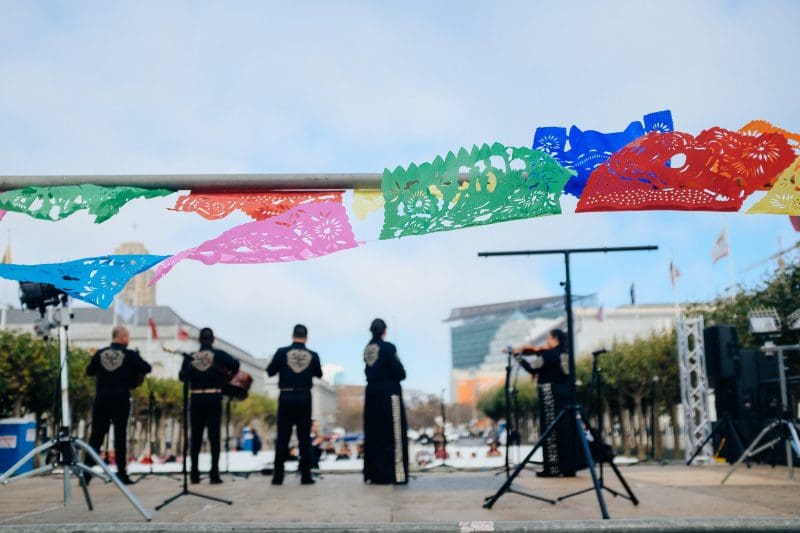
Mariachi music is more than just a genre. It’s a living testament to Mexico’s rich cultural heritage and enduring spirit. Through its lively rhythms, powerful melodies, and heartfelt lyrics, mariachi music uniquely connects with listeners on a deep emotional level, transcending borders and uniting people from diverse backgrounds.
As we explore and celebrate the fascinating world of mariachi music, it is essential to remember and honour the traditions, musicians, and history that have shaped this beloved art form. In doing so, we can ensure that mariachi music will continue to thrive and evolve, serving as a vibrant and vital expression of Mexico’s soul for generations to come.








